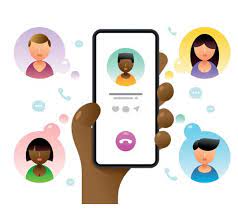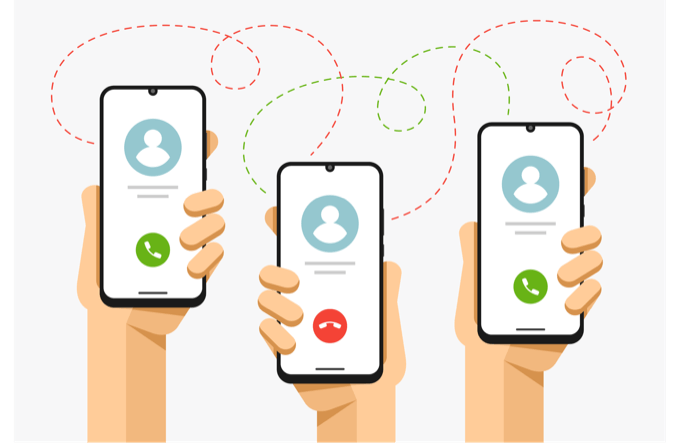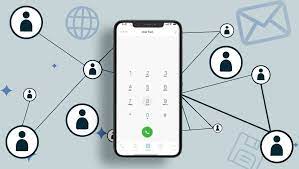Introduction
In an era where staying connected is more essential than ever, unlimited call and SMS plans have revolutionized how people communicate. Gone are the days when every phone call or text message came with a cost that made users think twice before pressing the dial button. Today, most telecom providers offer unlimited talk and text as standard features in their mobile plans, reflecting a major shift in consumer expectations and technological capabilities.
But how did we get here? What are the real advantages of unlimited calling and texting? And how do these offerings fit into the broader picture of mobile communication in the digital age? This article explores the rise of unlimited call and SMS services, their impact on consumers and industries, and what the future may hold.
Table of Contents

A Brief History of Call and SMS Plans
The Early Days
In the early 1990s and 2000s, mobile users were charged per minute for calls and per message for texts. These charges could be expensive, especially for long-distance or international communication. Many people used phones sparingly or opted for landlines to avoid high mobile bills.
The Rise of Bundled Plans
As mobile usage increased, telecom companies began offering bundled plans: a set number of minutes and texts for a fixed price. This gave users some breathing room but still came with limitations. Overage fees were common, and users had to track their usage carefully.
The Breakthrough: Unlimited Plans
Around 2010, telecom providers began experimenting with unlimited voice and SMS plans, especially in North America, Europe, and parts of Asia. As the technology to carry high volumes of voice and text became more cost-effective, telecom companies started offering:
- Unlimited local and national calls
- Unlimited SMS to all networks
- Flat monthly rates
This shift gave users freedom and drastically changed mobile communication behavior.
How Unlimited Calls and SMS Work
Behind the Scenes Technology
Calls and texts used to rely on circuit-switched networks (2G/3G), where each communication session had a dedicated channel. However, with the transition to 4G and 5G, most telecoms now use VoIP (Voice over Internet Protocol) or VoLTE (Voice over LTE). These technologies allow:
- Better call quality
- Lower operational costs
- Simultaneous use of data and voice
Since these systems can handle a large volume of simultaneous users, it’s now economically viable for providers to offer unlimited access.
Key Benefits of Unlimited Calling and Texting
- Predictable Monthly Costs
Unlimited plans eliminate the surprise of extra charges. Whether you make one call or a thousand, your bill remains the same. This is especially helpful for:
- Families with shared plans
- Students on tight budgets
- Business users with high call volume
- Peace of Mind
There’s no need to count texts or watch the clock during long conversations. Unlimited plans give users freedom and confidence.
- Enhanced Productivity
For professionals and businesses, unlimited calls allow:
- Better client communication
- Quick coordination with teams
- Constant connectivity without barriers
- Better Value for Money
When bundled with data plans, unlimited call and SMS packages often provide more value per dollar than metered services.
Unlimited vs. Pay-As-You-Go: A Comparison
| Feature | Unlimited Plan | Pay-As-You-Go |
|---|---|---|
| Cost | Fixed monthly fee | Charges based on usage |
| Best For | Heavy users, professionals, families | Light users, travelers |
| Convenience | Very high | Medium |
| Risk of Extra Charges | None | High (if usage spikes) |
| International Support | May include add-ons | Usually more expensive per unit |

Do People Still Use SMS in the Era of WhatsApp?
Absolutely! While messaging apps like WhatsApp, iMessage, and Telegram have changed the game, SMS remains relevant in several ways:
- Authentication: Most websites and apps use SMS to send 2FA (Two-Factor Authentication) codes.
- Emergency Alerts: Governments and service providers send alerts via SMS.
- Universal Access: Not all users have smartphones or internet access, but almost every phone can receive SMS.
Unlimited SMS ensures users stay connected regardless of platform or app availability.
Unlimited International Calls and SMS: Are They Real?
Some mobile operators offer international unlimited packages, but these typically come with:
- A list of included countries
- Fair usage policies (e.g., 3,000 minutes per month)
- Exclusions for premium numbers
These are ideal for people who:
- Have family abroad
- Run international businesses
- Travel frequently
For countries outside the “unlimited zone,” providers may offer discounted international rates or add-on packs.
Limitations and Fine Print
Despite the term “unlimited,” many plans come with fair usage policies (FUP). These may include:
- Throttling after a set number of minutes (e.g., 10,000 minutes/month)
- Restrictions on automated calling
- Limitations on business use under personal plans
It’s essential to read the fine print before committing to a plan.
Popular Unlimited Plans Around the World
United States
- T-Mobile Magenta Max: Unlimited everything with high-speed data.
- Verizon Unlimited Plus: Includes calls, texts, and hotspot access.
- AT&T Unlimited Elite: Unlimited with HBO Max and 5G access.
United Kingdom
- EE Unlimited Data Plans: Includes unlimited calls/texts and 5G data.
- Vodafone Unlimited Max: Great for travelers with roaming options.
India
- Jio, Airtel, Vi: Offer some of the world’s most affordable unlimited call/SMS/data plans, starting as low as ₹239/month (approx. $3 USD).
Pakistan
- Jazz, Zong, Telenor: Provide daily, weekly, and monthly unlimited bundles for on-network and off-network calls and SMS.
Business Use: Enterprise-Level Unlimited Plans
Corporates and SMBs often use business-specific plans that offer:
- Unlimited intra-network calls
- Special business SMS rates (e.g., for marketing)
- Device management tools
- Analytics and usage reporting
These plans help organizations stay efficient, productive, and scalable.
Click here to open

The Role of 5G in Voice and Messaging
With the global rollout of 5G networks, the quality and capacity for calls and messages will only improve:
- HD voice and video calling
- Zero-latency connections
- Network slicing for call priority
5G could also pave the way for advanced messaging platforms like RCS (Rich Communication Services), combining the power of SMS with the features of modern apps (read receipts, media sharing, etc.).
Environmental Impact of Unlimited Plans
With users making more calls and using more data, network infrastructure has expanded significantly. Fortunately, telecom companies are:
- Investing in green energy for data centers
- Using AI for efficient routing
- Creating low-power 5G towers
Unlimited plans must balance convenience with sustainable network growth.
Future of Unlimited Call and SMS Services
As technology evolves, we may see:
- Global roaming unlimited plans (with fixed pricing)
- AI-powered voice translation during calls
- Integration with smart assistants
- Unified messaging platforms where SMS, email, and app messages coexist
Even though voice assistants, chatbots, and video calls are rising, the simplicity and universality of SMS and voice calls mean they’ll remain relevant.
Conclusion: Communication Without Limits
Unlimited calls and SMS have redefined communication by removing barriers and creating a seamless user experience. Whether you’re a professional who spends hours on the phone, a student who loves to text, or a traveler connecting with family across borders, unlimited plans provide freedom, flexibility, and value.
As technology continues to advance, these services will only get smarter, faster, and more integrated, ensuring that we stay connected—no matter where we are or how much we talk.
Read more:https://a.meks.site/wp-admin/post.php?post=79&action=edit
